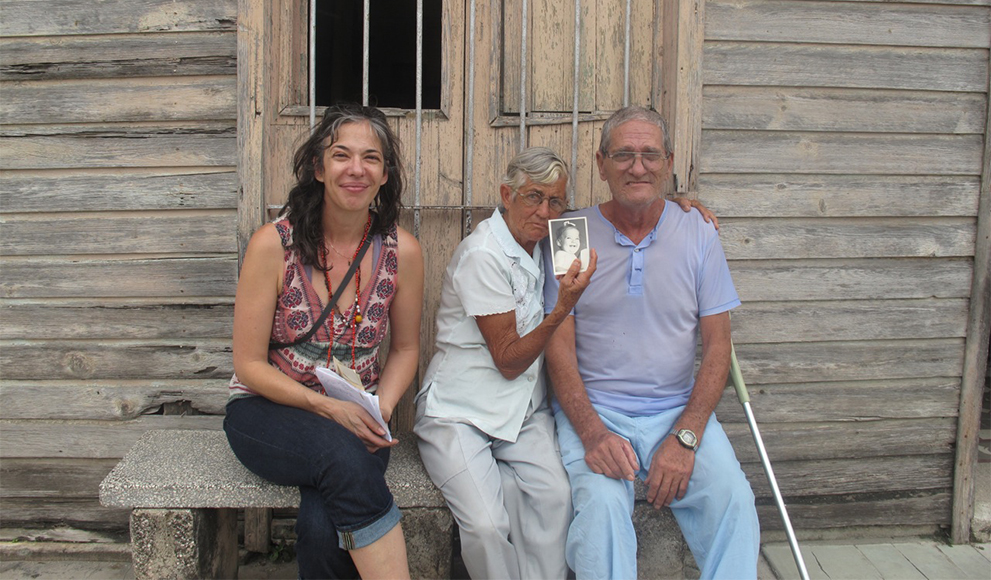
One of the most accomplished Cuban-American playwrights of her generation, Melinda López is also an actress. She is one of the Mellon Foundation National Playwright Residents (Huntington Theatre Company) and a 2019 Mass Cultural Council Fellow in dramatic writing. The daughter of Cuban exiles who left Cuba and eventually settled in the US in the early 1960s, Melinda was born in Cali, Colombia in 1964 and grew up in Bedford, Massachusetts. While her plays include a variety of subjects and themes, it is her work about Cuba that has received wide acclaim in the last decade. Her principal plays on Cuba: Sonia Flew (2004) (Huntington Theatre Company, Steppenwolf Theatre Company, Laguna Playhouse, San Jose Repertory Theatre) and Becoming Cuba (2014) (Huntington Theatre Company and North Coast Repertory Theatre) portray a series of dilemmas related to family, nation and the effects of history in the individual. Sonia Flew (2004) is a story of diasporas and the events related to the Cuban children’s exodus at the beginning of the Cuban Revolution (1960-62) that came to be known as Pedro Pan. Becoming Cuba (2014) presents a number of characters that are affected by the Cuban-Spanish-American War (1898). These plays were translated into Spanish [Ser Cuba and Sonia Se Fue] and published in Havana in 2018 by Ediciones Alarcos. Both were performed and presented at the 2018 National Theatre Festival in Camaguey, Cuba, where Melinda was able to travel and research her family’s roots.
Her next play, Mala (2018) (Arts Emerson, Guthrie Theatre, Huntington Theatre Company, Old Globe Theatre) is a solo performance that engages the mystery and comedy of caring for our loved ones at the end of life. While Mala is associated directly with Cuban-American themes, it is the story of her Cuban mother’s immigrant past and its effects on the daughter that are central to the understanding of this work. Deeply funny and unsentimental, Mala earned the 2017 Elliot Norton Award for Best New Play and an Arts Impulse Award for Best Solo Performance. Melinda’s most recent translation and adaptation of García Lorca’s Yerma was performed in Boston during the month of June 2019 to wide critical acclaim. She is currently working on an adaptation of Shakespeare’s Twelfth Night, framed through the lens of a young balsera. She recently received the 2019 Elliot Norton Award for Sustained Excellence. Melinda is a professor at Northeastern University and resides in the Boston area.
performance that engages the mystery and comedy of caring for our loved ones at the end of life. While Mala is associated directly with Cuban-American themes, it is the story of her Cuban mother’s immigrant past and its effects on the daughter that are central to the understanding of this work. Deeply funny and unsentimental, Mala earned the 2017 Elliot Norton Award for Best New Play and an Arts Impulse Award for Best Solo Performance. Melinda’s most recent translation and adaptation of García Lorca’s Yerma was performed in Boston during the month of June 2019 to wide critical acclaim. She is currently working on an adaptation of Shakespeare’s Twelfth Night, framed through the lens of a young balsera. She recently received the 2019 Elliot Norton Award for Sustained Excellence. Melinda is a professor at Northeastern University and resides in the Boston area.
The playwright will be interviewed by the distinguished literary critic Isabel Álvarez-Borland, a member of our Theater Program.
This event is part of our CreateNYC Language Access Series on Cuban History, Art, and Literature. It will be held in English and will be streamed through our YouTube channel.
TO ATTEND, CLICK HERE ON THE SCHEDULED DATE AND TIME:
https://Youtu.be/uMZQ7V39EG0
To participate in the Q&A via Zoom, click here:
https://us06web.zoom.us/j/89526024766
[Image above: Melinda López with old family neighbors in Camagüey, Cuba in 2018.]
 Isabel Álvarez-Borland is Distinguished Professor Emerita of Arts and Humanities in the Department of Spanish at the College of the Holy Cross, Worcester, Massachusetts. Her books include Cuban-American Literature of Exile: From Person to Persona (University of Virginia Press, 1998) and Discontinuidad y ruptura en Guillermo Cabrera Infante (Hispamérica, 1982). She is coeditor of Negotiating Identities in Cuban American Art and Literature (SUNY Press, 2009) and of Identity, Memory, and Diaspora (SUNY Press, 2008). Her essays on Cuban and Latin American Literature have appeared in scholarly journals such as Hispanic Review, MLN and Revista Iberoamericana. In 2006, she was codirector of an NEH Summer Seminar for College Teachers: Negotiating Identities in Art, Literature and Philosophy: Cuban Americans and American Culture. Currently she is Associate Editor of Hispania and a member of the Board of Directors of the Cuban Cultural Center of New York.
Isabel Álvarez-Borland is Distinguished Professor Emerita of Arts and Humanities in the Department of Spanish at the College of the Holy Cross, Worcester, Massachusetts. Her books include Cuban-American Literature of Exile: From Person to Persona (University of Virginia Press, 1998) and Discontinuidad y ruptura en Guillermo Cabrera Infante (Hispamérica, 1982). She is coeditor of Negotiating Identities in Cuban American Art and Literature (SUNY Press, 2009) and of Identity, Memory, and Diaspora (SUNY Press, 2008). Her essays on Cuban and Latin American Literature have appeared in scholarly journals such as Hispanic Review, MLN and Revista Iberoamericana. In 2006, she was codirector of an NEH Summer Seminar for College Teachers: Negotiating Identities in Art, Literature and Philosophy: Cuban Americans and American Culture. Currently she is Associate Editor of Hispania and a member of the Board of Directors of the Cuban Cultural Center of New York.
This event is presented in celebration of Women’s History Month, and is supported, in part, by public funds from the New York City Department of Cultural Affairs in partnership with the City Council, and made possible by the New York State Council on the Arts with the support of the Office of the Governor and the New York State Legislature.
![]()
![]()
With the promotional collaboration of
 and
and
![]()